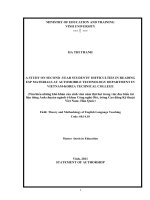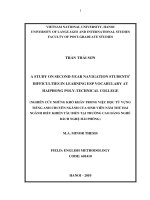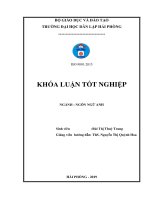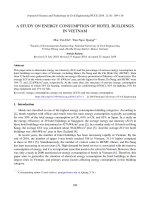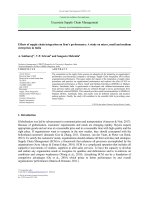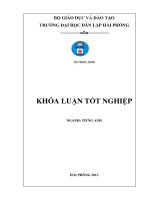A study on second year student's difficulties in reading esp materials at automobile technology departement in vietnam korea technical college
Bạn đang xem bản rút gọn của tài liệu. Xem và tải ngay bản đầy đủ của tài liệu tại đây (843.19 KB, 101 trang )
MINISTRY OF EDUCATION AND TRAINING
VINH UNIVERSITY
--- ---
HA THI THANH
A STUDY ON SECOND -YEAR STUDENTS’ DIFFICULTIES IN READING
ESP MATERIALS AT AUTOMOBILE TECHNOLOGY DEPARTMENT IN
VIETNAM-KOREA TECHNICAL COLLEGE
(Tìm hiểu những khó khăn của sinh viên năm thứ hai trong việc đọc hiểu tài
liệu tiếng Anh chuyên ngành ở khoa Công nghệ Ôtô, trờng Cao đẳng Kỹ thuật
Việt Nam- Hàn Quốc)
Field: Theory and Methodology of English Language Teaching
Code: 60.14.10
Master thesis in Education
Vinh, 2011
STATEMENT OF AUTHORSHIP
1
I hereby certify that the thesis entitled
A STUDY ON SECOND-YEAR STUDENTS’ DIFFICULTIES IN READING
ESP MATERIALS AT AUTOMOBILE TECHNOLOGY DEPARTMENT
IN VIETNAM - KOREA TECHNICAL COLLEGE
is the result of my own research for the Degree of Master of Education at Vinh
University. I confirm that this thesis has not been submitted for any other degrees.
Student’s signature
Hà Thị Thanh
2
ACKNOWLEDGEMENTS
I would like to express my deepest thanks to my beloved supervisor Dr. Le
Van Canh for his invaluable support, patient guidance, and encouragement he gave
me throughout my research. I am truly grateful to him for his advice and
suggestions right from the beginning when this study was only in its formative
stage.
I also wish to send my sincere thanks to the students of the classes I visited
in order to gather information for my survey questionnaire. Without their help, this
study could not have been successful.
I am indebted to my friends, my classmates, as well as my colleagues for
their invaluable comments and criticism and also for their continued interest and
encouragement.
Finally, I would like to express my gratitude to family members whose
support and encouragement greatly contributed to the completion of my study.
3
ABSTRACT
Reading is one of the four important skills in learning English, especially
English for specific purposes (ESP). For non-English major students at VietnamKorea Technical College, reading has been given the first priority and has been paid
more attention as the students have to read English materials related to their own
specialist subject. However, they have encountered a lot of difficulties in reading
ESP materials and, therefore, failed to become efficient readers. What, then, are the
difficulties that the students at Vietnam-Korea Technical College encounter when
reading ESP materials? And what hinders their reading comprehension?
Many studies have already been conducted in the area of reading problems.
This study aims to examine the difficulties in ESP reading for the second-year
students at Vietnam-Korea Technical College and the causes of their unsuccessful
reading comprehension.
The results of this study has shown that the second-year students often have
difficulties in many areas of the language such as difficulties with ESP vocabulary,
discourse, reading skills and subject background knowledge when dealing with ESP
texts and their unsuccessful reading comprehension comes from different sources:
inadequate ESP vocabulary, limited background knowledge about the subject,
unsuitable materials, the teachers’ teaching methods as well as the negative attitude
of some students. This study has also suggested some solutions to help to reduce
their difficulties in reading ESP and obtain desirable achievements in ESP reading.
4
LIST OF ABBREVIATIONS
EFL: English as Foreign Language
EGP: English for General Purposes
ELT: English Language Teaching
ESP: English for Specific Purposes
FL: foreign language
GE: General English
L1: first language
L2: second language
TALO: text and as a linguistic object
TAVI: text as a vehicle of information
VKTC: Vietnam-Korea Technical College
5
LIST OF TABLES AND FIGURES
Table 3.1. Students’ attitudes towards ESP reading
44
Table 3.2. The difficulties in terms of ESP vocabulary
46
Table 3.3. The difficulties in terms of grammar
47
Table 3.4. The difficulties in terms of text discourse
49
Table 3.5. The difficulties related to lack of background knowledge
51
Table 3.6. The difficulties due to lack of reading skills
52
Table 3.7. Rank order of difficulties in ESP reading
54
Table 3.8. Students’ views of sources of difficulties
55
Table 3.9. The students’ needs for ESP materials
59
Table 3.10. The students’ needs for teachers’ methodology
61
Figure 2.1: The vicious circle of the weak readers
15
Figure 3.1. Students’ attitudes towards ESP reading
44
Figure 3.2. Causes of difficulties from materials
56
Figure 3.3. Causes of difficulties from teachers
58
Figure 3.4. Causes of difficulties from students
59
Figure 4.1: Automobile parts
65
Figure 4.2: Automobile systems
66
Figure 4.3: Automobile inside parts
66
Figure 4.4: Parts of an automobile fuel system
67
Figure 4.5: Diagram of the fuel flow
68
6
APPENDIX A
Questionnaire for students
This questionnaire is designed for my research into difficulties in ESP
reading of the second year students in Vietnam – Korea Technical College. Your
assistance in completing the survey is appreciated. All the information provided by
you is solely for the study purpose, and you can be confident that you will not be
identified in any discussion of the data.
Thank you very much for your cooperation!
*Where do you come from?
□ Rural
□ Urban
*Did you learn English before entering Vietnam-Korea Technical College?
□ Yes
□ No
- If Yes, when did you start learning English? ……………………………
- If No, did you learn any other foreign languages? ……………………….
* What is your average mark of General English in the first year? ………………..
Section A: Do you agree with these?
Question 1: I need to read technical texts well for my future job.
□ Strongly agree
□ Agree
□ Disagree
□ Strongly disagree
Question 2: I find it difficult to understand technical texts because my technical
words are limited.
□ Strongly agree
□ Agree
□ Disagree
□ Strongly disagree
Question 3: I like reading texts about my specialized topics.
□ Strongly agree
□ Agree
□ Disagree
□ Strongly disagree
Section B: Here are some of difficulties you may encounter when reading ESP.
Please tick the appropriate box according to the level of difficulties you have.
7
Very difficult (VD)
Difficult (D)
Easy (E)
Very easy (VE)
Question 4: Difficulties with ESP vocabulary
VD
D
E
VE
4a. I find it difficult to pronounce technical words
□
□
□
□
4b. I find it difficult to understand the meaning of technical
□
□
□
□
□
□
□
□
□
□
□
□
□
□
□
□
□
□
□
□
□
□
□
□
□
□
□
□
terms in reading texts
4c. I find it difficult to memorize technical terms ( such as:
ignition, lubrication, spark plugs.......)
4d. I have troubles in using idomatic expressions and
phrasal verbs (such as: convert into, by means of...)
4e. When a word has many meanings, I don’t know which
meaning is used in the reading text.
4f. Others (Please indicate here)
………………………………….……………….................
Question 5: Difficulties with Grammar
5a. I don’t remember all grammatical structures that I have
learnt and this makes it difficult to understand the content
of the reading text
5b. If the sentence is a new grammatical structure in the
text I do not understand its meaning
5c. Long sentences are difficult to me to understand their
meanings
5d. Others (Please indicate here)
………………………………….……………….................
Question 6: Difficulties with the Text Discourse
8
6a. I don’t understand how a reading text is organized and
VD
D
E
VE
□
□
□
□
□
□
□
□
□
□
□
□
□
□
□
□
□
□
□
□
VD
D
E
VE
□
□
□
□
□
□
□
□
□
□
□
□
VD
D
E
VE
this makes it difficult to understand the content of the text.
6b. I don’t understand how a paragraph is organized and
this makes it difficult to understand its content.
6c. I cannot find which is the most important sentence in
each paragraph of the reading text.
6d. I have problems understanding how meanings of
different sentences are linked together.
6e. Understanding graphs and diagrams is difficult to me.
6f. Others (Please indicate here)
………………………………….……………….................
Question 7: Difficulties related to Lack of Background Knowledge
7a. I find it difficult to understand the content of unfamiliar
professional topics
7b. I find I don’t have enough professional knowledge
related to the topics.
7c. I find it difficult to understand authentic materials.
7d. Others (Please indicate here)
………………………………….……………….................
Question 8: Difficulties due to Lack of Reading Skills
9
8a. I find it difficult to find out the main idea of a reading
□
□
□
□
□
□
□
□
□
□
□
□
□
□
□
□
□
□
□
□
□
□
□
□
text
8b. I find it difficult to find out the specific ideas of a
reading text.
8c. I don’t know how to guess meanings of new words in a
reading text
8d. I find it difficult to recognize what the writer wants to
imply in a reading text
8e. I find it difficult to summarize the mains ideas of a
reading text
8f. I don’t know how to answer comprehension questions
of a reading text.
8g. Others (Please indicate here)
…………………………………...........................................
Section C
Question 9: Please indicate what possible sources of your problems in ESP
reading
YES
NO
9a. The texts are very too long and full of technical terms
□
□
9b. The texts are full of new and complex grammar structures
□
□
9c. Some texts are taken from authentic materials, which
□
□
9d. The teacher doesn’t teach us sufficient reading strategies
□
□
9e. The teacher doesn’t give us sufficient practice of grammar
□
□
makes us difficult to understand
and vocabulary
10
9f. The teacher is too strict and demanding
□
□
9g. I lack confidence and motivation
□
□
9h. I lack vocabulary especially ESP vocabulary
□
□
9i. I lack knowledge about the topics I am studying
□
□
9j. Others ( Please indicate here)
…………………………….............
Question 10: To make your ESP reading easier, what do you think must be adjusted
in the ESP materials ( choose as many as possible)
10a. Reading texts should be more related to my future job
□
10b. Reading texts should be shorter and more motivating
□
10c. Reading texts should have a limited number of new words
□
10d. Technical terms should be explained more carefully
□
10e. Grammatical exercises should be more various in form
□
10f. Others ( Please indicate here)
…………………………………………………………
Question 11: To help you read ESP better, what in your opinion do you expect from
the teachers? (Choose as many as possible)
11a. I expect the teacher to give and carefully explain technical words
□
11b. I expect the teacher to explain carefully grammatical structures in the
□
reading texts
11c. I expect the teacher to provide us more background knowledge
□
related to the topics we are working on
11d. I want the teacher to guide us to choose suitable reading strategies for
11
□
each reading text
11e. I want the teacher to let us work in pairs and in groups
□
11f. I want the teacher to give us more communicative activities to help
□
remember vocabulary more easily
11g. I want the teacher to check us more often about translation
□
11h. Others ( Please indicate here)
…………………………………………………………
Thank you for taking time to complete this questionnaire
APPENDIX B
PHIÕU §IỊU TRA NGHI£N CøU
Bảng câu hỏi dưới đây nhằm phục vụ nghiên cứu tìm hiểu những khó khăn
trong việc đọc hiểu tiếng Anh chuyên ngành của học viên năm thứ hai Trường Cao
đẳng Kỹ thuật Việt Nam - Hàn Quốc và những nguyên nhân gây ra những khó khăn
đó. Các câu trả lời mà các bạn cung cấp rất quan trọng đối với công trình nghiên
cứu này. Dữ liệu điều tra sẽ chỉ được sử dụng cho việc nghiên cứu, khơng vì mục
đích nào khác. (Chỉ có người nghiên cứu mới được biết câu trả lời của các bạn vì
vậy mong các bạn trả lời theo đúng suy nghĩ của mình.)
Cảm ơn sự hợp tác của các bạn
Xin bạn vui lòng cho biết:
* Bạn từ đâu đến?
□ Nông thôn
□ Thành thị
*Trước khi vào trường Cao đẳng Kỹ thuật Việt Nam - Hàn Quốc bạn có được học
tiếng Anh khơng?
□ Có
□ Khơng
- Nếu có thì bắt đầu học khi nào ? ……………………………
- Nếu khơng thì bạn được học ngoại ngữ nào? ……………………….
* Điểm trung bình môn tiếng Anh đại cương của bạn trong năm học đầu là bao
nhiêu? ………
12
Phần A: Bạn có đồng ý với những ý kiến sau không ?
Câu hỏi 1: Tôi cần phải đọc tốt các tài liệu tiếng Anh chun ngành vì cơng việc
tương lai của tơi
□ Hồn tồn đồng ý
□ Đồng ý
□ Khơng đồng ý
□ Hồn tồn khơng đồng ý
Câu hỏi 2: Tơi thấy đọc hiểu các tài liệu kỹ thuật thật khó vì vốn từ vựng chun
ngành của tơi hạn chế
□ Hồn tồn đồng ý
□ Đồng ý
□ Khơng đồng ý
□ Hồn tồn khơng đồng ý
Câu hỏi 3: Tơi thích đọc các tài liệu tiếng Anh về chun ngành chun ngành của
tơi
□ Hồn tồn đồng ý
□ Đồng ý
□ Khơng đồng ý
□ Hồn tồn khơng đồng ý
Phần B: Dưới đây làm một số khó khăn các bạn có thể thường gặp trong q trình
đọc hiểu tiếng Anh chuyên ngành. Bạn hãy cho biết những khó khăn mà bạn gặp
theo các mức độ:
Rất khó (RK)
Khó (K)
Dễ (D)
Rất dễ (RD)
Câu hỏi 4: Khó khăn về từ vựng chun ngành
RK
K
D
RD
4a. Tơi thấy khó phát âm các từ kỹ thuật
□
□
□
□
4b. Tơi thấy khó hiểu nghĩa của các từ kỹ thuật trong
□
□
□
□
□
□
□
□
□
□
□
□
các bài đọc hiểu
4c. Tơi thấy khó nhớ các từ kỹ thuật (như ignition,
lubrication, spark plugs.......)
4d. Tôi gặp khó khăn khi sử dụng các thành ngữ và
các cụm động từ (như convert into, by means of...)
4e. Khi một từ có nhiều nghĩa, tơi khơng biết nghĩa
nào được sử dụng trong bài đọc hiểu đó.
13
4f. Các ý kiến khác:
………………………………................
Câu hỏi 5: Khó khăn về ngữ pháp
5a. Tôi không nhớ hết tất cả các cấu trúc ngữ pháp đã
RK
K
D
RD
□
□
□
□
□
□
□
□
□
□
□
□
RK
K
D
RD
□
□
□
□
□
□
□
□
□
□
□
□
□
□
□
□
□
□
□
□
học và điều này gây khó khăn cho tôi trong việc hiểu
nội dung của bài đọc hiểu.
5b. Tơi khơng hiểu nghĩa của câu nếu nó là một cấu
trúc ngữ pháp mới trong bài đọc hiểu đó
5c. Tơi thấy khó hiểu nghĩa những câu văn dài
5d. Các ý kiến khác:
………………………………................
Câu hỏi 6: Khó khăn về cách hành văn của văn bản
6a. Tôi không hiểu cấu trúc của một bài đọc và điều
này gây khó khăn cho tơi khi hiểu nội dung của bài
6b. Tôi không hiểu cấu trúc của một đoạn văn và điều
này gây khó khăn cho tơi khi hiểu nội dung của nó.
6c.Tơi khơng thể phát hiện ra câu văn quan trọng nhất
trong mỗi đoạn văn của một bài đọc hiểu.
6d.Tơi gặp khó khăn khi hiểu sự liên kết về nghĩa của
các câu văn
6e. Hiểu các biểu đồ, sơ đồ thật khó đối với tơi
6f. Các ý kiến khác:
14
………………………………................
Câu hỏi 7: Khó khăn liên quan đến kiến thức chun ngành
7a. Tơi thấy khó hiểu nội dung của các vấn đề chuyên
RK
K
D
RD
□
□
□
□
□
□
□
□
□
□
□
□
ngành không phổ biến
7b. Tôi thấy bản thân mình khơng đủ kiến thức chun
ngành liên quan đến những vấn đề mà tơi đang học
7c. Tơi thấy khó khi đọc các tài liệu nguyên bản
7d. Các ý kiến khác ………………………………….
……………….................
Câu hỏi 8: Khó khăn vì thiếu kỹ năng đọc hiểu
8a.Tơi thấy khó để tìm ra ý chính của một bài đọc
RK
K
D
RD
□
□
□
□
□
□
□
□
□
□
□
□
□
□
□
□
□
□
□
□
□
□
□
□
hiểu
8b. Tơi thấy khó để tìm ra những ý chi tiết của một
bài đọc hiểu
8c. Tôi không biết cách đoán nghĩa của các từ mới
trong một bài đọc hiểu
8d. Tơi thấy khó khăn để nhận ra điều tác giả ngụ ý
trong một bài đọc hiểu
8e.Tơi thất tóm tắt các ý chính của một bài đọc hiểu
thật khó
8f. Tơi khơng biết cách trả lời các câu hỏi của một bài
đọc hiểu
15
8g. Các ý kiến khác:
………………………………...............
Phần C
Câu hỏi 9: Bạn hãy cho biết những nguyên nhân có thể gây khó khăn trong việc đọc
hiểu tiếng Anh chuyên ngành
ĐÚNG
SAI
9a. Các bài đọc rất dài và nhiều thuật ngữ kỹ thuật
□
□
9b. Các bài đọc nhiều các cấu trúc ngữ pháp mới và phức tạp
□
□
9c. Một số bài đọc lấy từ tài liệu nguyên bản và điều này gây khó
□
□
9d. Giáo viên khơng dạy chúng tôi đầy đủ các kỹ năng đọc
□
□
9e. Giáo viên không tổ chức các hoạt động cho chúng tôi luyện tập
□
□
9f. Giáo viên quá khắt khe và yêu cầu cao
□
□
9g. Tơi khơng có đủ tự tin và động cơ học tiếng Anh chuyên
□
□
9h. Tôi thiếu vốn từ vựng đặc biệt là từ vựng chuyên ngành
□
□
9i. Tôi thiếu kiến thức chuyên ngành của các vấn đề tôi đang học
□
□
khăn cho chúng tôi khi hiểu nội dung của bài
ngữ pháp và từ vựng
ngành
9j. Các ý kiến khác: ………………………………...............
Câu hỏi 10. Để giúp các bạn đọc tiếng Anh chuyên ngành dễ dàng hơn, theo bạn
giáo trình tiếng Anh chuyên ngành nên điều chỉnh và bổ sung như thế nào? (Bạn có
thể đánh dấu vào các ô sau tuỳ ý)
10a. Các bài đọc hiểu nên gắn sát với nghề nghiệp tương lai của tôi
□
10b. Các bài đọc hiểu nên ngắn hơn và tạo hứng thú hơn
□
16
10c. Các bài đọc hiểu nên có lượng từ mới vừa phải
□
10d. Các thuật ngữ kỹ thuật nên được giải thích kỹ càng hơn
□
10e. Các bài tập ngữ pháp nên phong phú, đa dạng hơn
□
10f. Các ý kiến khác:
□
…………………………………………………………..
Câu hỏi 11. Để giúp các bạn đọc tiếng Anh chuyên ngành tốt hơn bạn mong điều gì
ở giáo viện trong việc dạy đọc hiểu. (Bạn có thể đánh dấu vào các ô sau tuỳ ý)
11a. Tôi muốn giáo viên giải thích kỹ hơn các thuật ngữ kỹ thuật
□
11b. Tôi muốn giáo viên giải thích kỹ hơn các cấc trúc ngữ pháp trong các
□
bài đọc hiểu
11c. Tôi muốn giáo viên cung cấp các kiến thức nền liên quan đến những
□
chủ đề chúng tôi đang học
11d. Tôi muốn giáo viên hướng dẫn chúng tôi cách lựa chọn các kỹ năng
□
đọc phù hợp với từng bài đọc
11e. Tôi muốn giáo viên cho phép chúng tơi học theo cặp hoặc theo nhóm
□
11f. Tơi muốn giáo viên tổ chức thêm các hoạt động giao tiếp trong giờ học
□
để giúp chúng tôi nhớ từ vựng dễ dàng hơn
11g. Tôi muốn giáo viên kiểm tra chúng tôi nhiều hơn về dịch thuật
11h. Các ý kiến khác ………………………………………………………
Cám ơn về sự hợp tác của các bạn!
TABLE OF CONTENTS
Acknowledgements
Abstract
List of abbreviations
List of tables and figures
17
□
CHAPTER I: INTRODUCTION
4
1.1. Rationale
4
1.2. Aims of the study
6
1.3. Research questions
6
1.4. Scope of the study
6
1.5. Method of the study
6
1.6. Design of the study
7
CHAPTER II: LITERATURE REVIEW
2.1. Reading and reading comprehension
8
8
2.1.1. Definition of reading
8
2.1.2. Reading comprehension
9
2.1.3. Factors involved in reading comprehension
11
2.2. Reading difficulties for foreign language learners
12
2.2.1. Language problem
12
2.2.2. Reading skill problem
14
2.2.3. Cultural background knowledge problem
15
2.3. Causes of difficulties in L2 reading
16
2.3.1. Low motivation
17
2.3.2. Insufficient reading skills
18
2.3.3. Language proficiency problem
22
2.3.4. Lack of background knowledge
24
2.3.5. Reading materials
24
2.3.6. Teaching methods
25
2.4. ESP and ESP reading
26
2.4.1. Definition of ESP
26
2.4.2. Differences between ESP and EGP
28
2.4.3. ESP reading skills
30
2.4.4. ESP reading materials
31
2.5. Factors causing difficulties for ESP readers
32
2.5.1. Technical vocabulary
32
2.5.2. Students’ competence
34
18
2.5.3. Authenticity of ESP materials
34
2.5.4. Lack of specialist background knowledge
37
2.6. Summary
37
CHAPTER III: THE STUDY
38
3.1. Research questions
38
3.2. The context of the study
38
3.2.1. The institution
38
3.2.2.The students
39
3.2.3. The teachers
39
3.2.4. The teaching and learning English at VKTC
40
3.3. The participants
41
3.4. Data collection instrument
41
3.5. Data collection procedure
43
3.6. Data analysis
43
3.7. Findings and discussion
43
3.7.1. Students’ attitudes towards ESP reading
43
3.7.2. Students’ perception of ESP reading difficulties
45
3.7.2.1. Difficulties with ESP vocabulary
46
3.7.2.2. Difficulties with Grammar
47
3.7.2.3. Difficulties with the Text Discourse
48
3.7.2.4. Difficulties related to Lack of Background Knowledge
50
3.7.2.5. Difficulties due to Lack of Reading Skills
52
3.7.2.6. Rank order of ESP reading difficulties
54
3.7.3. Causes of difficulties
55
3.7.3.1. The reading materials
56
3.7.3.2. The teachers
57
3.7.3.3. The students
58
3.7.4. The students’ expectation in terms of materials
59
3.7.5. The students’ expectation in terms of methodology
60
3.8. Summary
62
CHAPTER IV: PEDAGOGICAL IMPLICATIONS
19
64
4.1. Increasing students’ reading interest and motivation
4.1.1. Making ESP interesting
64
64
4.1.1.1.Using visual aids in teaching reading
65
4.1.1.2. Diverstifying reading activities
67
4.1.2. Raising students’ awareness of the usefulness of English
4.2. Training students to become efficient readers
68
69
4.2.1. Making students aware of the nature of the reading process
69
4.2.2. Making students aware of the purposes of reading
69
4.2.3. Teaching students different reading strategies
69
4.2.4. Encouraging students to develop extensive reading habits
72
4.3. Improving teachers’ classroom techniques and subject background knowledge
72
4.3.1. Employing three stages in ESP reading lessons
72
4.3.2. Giving homework and checking previous lessons frequently
74
4.3.3. Improving teachers’ professional knowledge
74
4.4. Developing ESP reading materials
75
4.4.1. Adusting and improving reading exercises
75
4.4.2. Reducing highly specialized texts
75
4.5. Summary
75
CHAPTER V: CONCLUSION
77
5.1. Summary of the findings
77
5.2. Limitations of the study and suggestions for further study
78
REFERENCES
79
APPENDICES
APPENDIX A (Questionnaire completed by the students)
APPNDIX B ( Translated version of the questionnaire)
20
